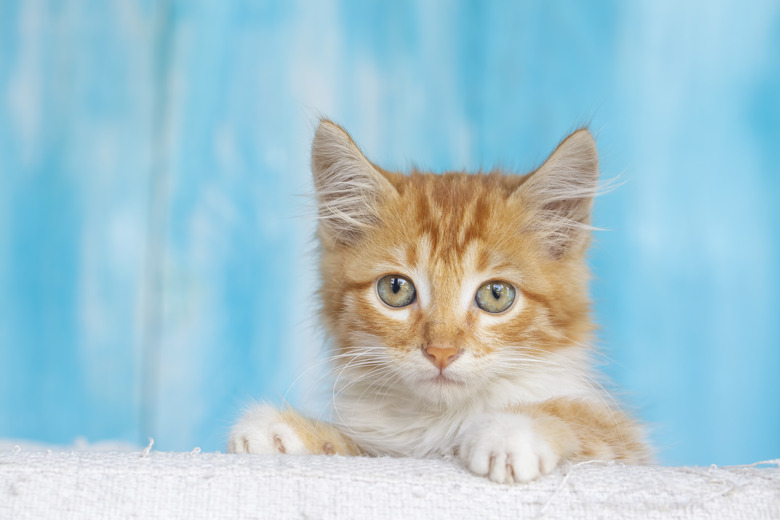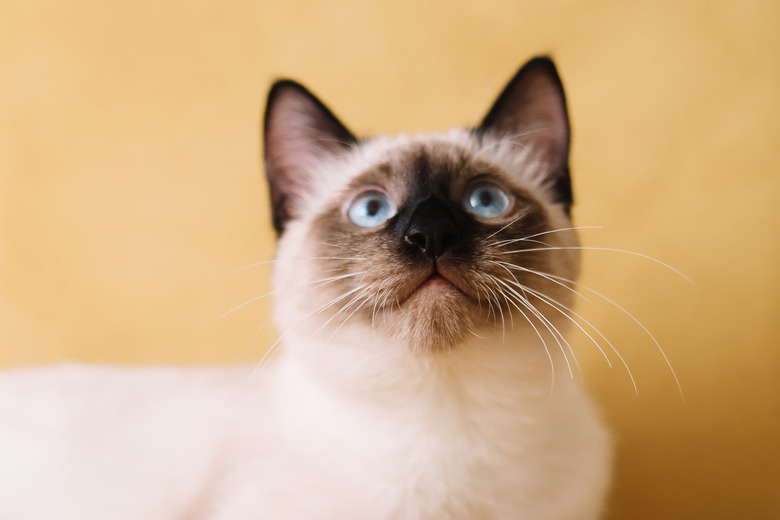Feline Herpes: Causes, Symptoms And Treatment
Odds are your cat harbors the feline herpesvirus, also known as feline herpesvirus-1, even if they're perfectly healthy. While it's a common virus in cats, it can prove fatal in kittens. Treating feline herpesvirus consists primarily of attending to the symptoms, which include respiratory and eye issues. Take your cat to the veterinarian at the first sign of any breathing difficulties or eye infection.
What is feline herpesvirus?
What
is feline herpesvirus?
Feline herpes, also known as feline viral rhinotracheitis (FVR), is an infection caused by feline herpesvirus type-1 (FHV-1), a virus. During flare-ups, infected cats shed the virus in their bodily secretions, including saliva and mucus. Cats contract the virus from direct contact with these fluids, either from an infected cat or from a contaminated object, such as a food bowl. For this reason, it's a good idea to thoroughly clean food bowls and litter boxes with disinfectant.
Once infected, cats become symptomatic in two to five days but can transmit the virus before symptoms become apparent. While the actual infection lasts up to three weeks, once symptoms subside, the cat carries the inactive virus for the rest of their life. In times of stress, outbreaks of the infection may occur.
Symptoms of feline herpesvirus
Symptoms of feline herpesvirus
If your cat suffers from an upper respiratory infection, it's possible that the feline herpesvirus, known as feline herpesviral rhinotracheitis, is behind it. Other symptoms include:
- Fever
- Nasal discharge
- Sneezing
- Drooling
- Enlarged lymph nodes
- Ocular discharge
Newborn kittens can suffer from herpesvirus conjunctivitis, which will cause their closed eyes to be goopy. Additional symptoms of a very severe case of feline herpesvirus include:
- Swollen conjunctiva
- Respiratory distress
- Keratitis, or inflammation and infection of the
cornea, which can lead to corneal ulcers or chronic dry eye
Causes of feline herpesvirus
Causes of feline herpesvirus
The primary reasons a cat becomes infected with the herpesvirus are:
- Weak immune system
- Direct contact with an infected cat
- Contact with the saliva or still-moist eye/nose discharge
of an infected cat via an inanimate object
All cats that have been infected with FVR carry the virus. However, when the virus is latent, or inactive, it is not contagious. Stress and illness can cause flare-ups of the virus, and during these times, the cat is infectious.
Diagnosis of feline herpesvirus
Diagnosis of feline herpesvirus
If you notice any irritation of your cat's eyes or respiratory system, you should seek veterinary care. To diagnose the herpesvirus, your veterinarian may run PCR testing, which is accomplished by swabbing the mouth, nose, or eyes. It's possible that because the viral infection is so often the cause of feline upper respiratory inflammation, your veterinarian will make a diagnosis based on clinical signs. Blood tests will not provide an accurate diagnosis.
Feline herpesvirus treatment
Feline herpesvirus treatment
There is no cure for the herpesvirus. However, there are effective forms of treatment for the symptoms, such as antiviral therapy. Supplementation such as oral l-lysine, an amino acid, can help keep outbreaks of the virus at bay.
Treatment for respiratory issues caused by feline
herpesvirus
Antibiotics can help treat any secondary bacterial infection of the upper respiratory tract. Alternatively, your veterinarian may prescribe antihistamines to clear your cat's nasal passages. Humidifying your cat's environment can also help relieve swollen nasal passages. Because your cat's sense of smell suffers with a congested nose, you might want to feed them smelly canned food, such as fish, to stimulate the appetite. If upper respiratory infection becomes severe, hospitalization may be needed for additional supportive care.
Treatment for eye infection caused by feline herpesvirus
Topical antibiotics or eye drops could be helpful for secondary bacterial infections of the eye. You must apply this medication into the eyes several times daily, for which some cats may have a low tolerance. Cats with recurring conjunctivitis due to FVR will likely be prescribed antiviral medication, like famciclovir.
In severe cases affecting the cornea, your DVM might refer you to a veterinary ophthalmologist, who can debride the area. While most cats recover with treatment, it's possible that vision loss will occur.
Prevention of feline herpesvirus infection
Prevention of feline herpesvirus infection
The herpesvirus is highly contagious among cats, but there are simple ways to reduce the risk that your cat will contract it.
- Vaccinate! Kittens can be vaccinated
as young as 6 to 8 weeks old. The vaccination does not completely prevent herpes,
but it can reduce the severity significantly. - Ensure your kitten or cat doesn't
live in a crowded environment with other cats. - Clean litter boxes and food bowls
quickly and frequently. - Minimize stress in your cat's
environment.
The bottom line
The bottom line
Feline herpesvirus is highly common and highly contagious during outbreaks. The virus usually reveals itself through clinical signs. There is no cure, but there are ways to lower your cat's risk of contracting the disease. There are also treatments for the symptoms or secondary infections that may arise. In severe cases, affected cats may need specialized veterinary care for their whole life, including chronic or intermittent anti-viral therapy, respiratory therapy, or surgical intervention.


